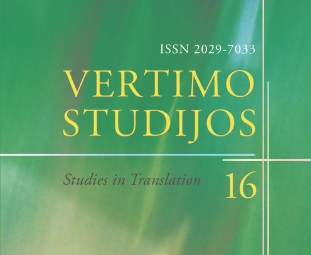Anastasija Belovodskaja
31 October 2013
BASIC INFORMATION
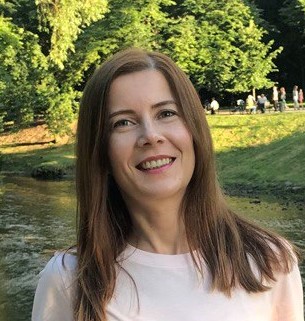
Associate professor
Address: Universiteto 5, LT-01513 Vilnius
Phone: +370 5 268 7224
Office hours: contact by email
Research interests:
- Media Linguistics
- Cognitive Linguistics
- Semantics and Pragmatics
- Foreign Language Teaching Methodologies: CLIL (Content and Language Integrated Learning); Blended Learning
Courses taught:
- Media Linguistics (1 and 3 semesters, MA)
- Semantics and Pragmatics (MA)
- Cognitive Linguistics (MA)
- Introduction to Linguistics (seminar, BA)
- Modern Russian: grammar, stylistics (BA)
- Lexicology (BA)
- Didactics and methodology of teaching Russian language (BA)
- Russian as Foreign Language (Erasmus)
PUBLICATIONS
Vilnius University Publications Database
Google Scholar profile:
https://scholar.google.com/citations?user=pHL6XIkAAAAJ&hl=ru
Main Publications (2016-2021)
Belovodskaja, A. (2021). Speech Etiquette of Russian-Speaking Online Communities in Lithuania. Book chapter. In: Duskaeva L. (eds) Speech Etiquette in Slavic Online Communities. Palgrave Macmillan, Cham. p.177-202
https://doi.org/10.1007/978-3-030-81747-3_8
Belovodskaja, A., Hornáček Banášová M., Katinas D., Lipavic Oštir A., Lipovec A., Volungevičienė S. (2021). Mathematics for life. Soft-CLIL Module for RFL (Математика для жизни. Модуль Soft-CLIL по РКИ): Textbook, 141 p., Teacher‘s book, 89 p., CD). University of Ss. Cyril and Methodius in Trnava http://kger.ff.ucm.sk/de/softclil-projektergebnisse/
Belovodskaja, A., Korostenskienė J. (in print, 2021). Humour of Solidarity in Russian-Speaking Discourse on Social Networking Groups in Lithuania. Book chapter. In: The Ethics of Humour in Online Slavic Media Communication. Routledge. ISBN 9780367689117
https://www.routledge.com/The-Ethics-of-Humour-in-Online-Slavic-Media-Communication/
Belovodskaja, A. (2020). Discourse Studies of Networks (Дискурсное изучение сетей). Medialingvistika slavjanskih stran: kollektivnaja monografija L. Duskaeva, L. Ivanova (eds). Moscow: Flinta, p. 251-286
Belovodskaja, A., Korostenskienė J. (2020). Address terms among the Russian ethnic minority in Lithuania in offline and online communication: an emerging new identity. Studies of transition states and societies, vol. 12, no. 2, p. 38-61
http://publications.tlu.ee/index.php/stss/article/view/853/723
Belovodskaja, A. (2019). Об исследовательском потенциале изучения хэштега как медиадискурсивного феномена (On expanding the research opportunities of the hashtag as a media discourse phenomenon). Медиалингвистика (Media linguistics), 6 (1), p. 60-74. DOI: 10.21638/spbu22.2019.105 https://medialing.ru/ob-issledovatelskom-potenciale-izucheniya-hehshtega-kak-mediadiskursivnogo-fenomena/
Belovodskaja, A. (2019). Власть симулякра в эпоху новых медиа: к вопросу об изучении информационных аномалий в цифровом медиапространстве (The power of simulacrum in the age of the power of new media: to the question of information disorder in the digital space). Perswazja językowa w różnych dyskursach (Language persuasion in various discourses), t. 3/ Red. Ż. Sładkiewicz, A. Klimkiewicz, M. Noińska. Tom III, Gdańsk: Wydawnictwo Uniwersytetu Gdańskiego, ISBN 9788378658016, p. 168-192.
Belovodskaja, A (2018). Фейковые новости (Fake news); Хештег/хэштег (Hashtag). Медиалингвистика в терминах и понятиях: словарь-справочник. Maskva: Flinta. ISBN 9785976539785, p. 416-423 (žodyno straipsniai).
Belovodskaja, A (2018). „Речь – Человек – Мир”: Речевое воздействие в разных дискурсах. II Международная научная конференция. Slavistica Vilnensis, t. 63. Vilnius : Vilniaus universiteto leidykla. ISSN 2351-6895, eISSN 2424-6115, p. 413-416. DOI: 10.15388/SlavViln.2018.63.11869. [CEEOL – Central and Eastern European Online Library; MLA]
Belovodskaja, A (2017). «Новые медиа» глазами лингвиста (о новых подходах к исследованию современного медиапространства). Стылістыка: мова, маўленне і тэкст : зборнік навуковых прац / пад агул. рэд. В.І. Іўчанкава. Мінск. Выдавецтво: Адукация и выхаванне. ISBN 9789854719443, p. 141-149.
Kobelyatskaya, M., Belovodskaja, A. (2017). Лингвомедийные технологии воздействия в телевизионных новостных программах. Стылістыка: мова, маўленне і тэкст : зборнік навуковых прац / пад агул. рэд. В.І. Іўчанкава. Мінск. Выдавецтво: Адукация и выхаванне. ISBN 9789854719443, p. 161-167.
Belovodskaja, A. (2016). Современные медиажанры: рецензия: от теории к практике (stidijų knyga)/ Vilnius: Vilniaus universiteto leidykla. ISBN 9786094597008, 106 p.
Belovodskaja, A. (2016). Интернет-мемы как репрезентанты медиаконцепта (к вопросу о методике анализа медиаобраза). Przegląd rusycystyczny, no 4. Katowice : "Śląsk" Sp. z o.o. Wydawnictwo Naukowe. ISSN 0137-298X, p. 118-132. [ERIH Plus]. https://www.journals.us.edu.pl/index.php/PR/article/view/5532
RESEARCH AND OTHER ACTIVITIES
PhD dissertation
- Сетевая пародия как лингвокогнитивный феномен (в контексте современного анонимного сетевого творчества)| Internet parody as a linguo-cognitive phenomenon (in the context of contemporary anonymous internet creative work). Vilnius University, 2012.
Research projects
- Project „Pedagogų rengimo studijų programų dalykų turinio skaitmenizavimas" (VU). Project expert 2021.10.25 – 2022.08.31
- Project „TestU Online - free portal of tests for education” (Erasmus+ KA2; Slovenská akademická asociácia pre medzinárodnú spoluprácu). Project researcher 2021 04 01 – 2023 03 31
- Project „Tęsk” (Institute of Educational Sciences at Vilnius University; 09.2.1-ESFA-V-727-01-0001): Practice Leader 2020 10 30 – 2021 06 11
- Project „Problemorientierter Soft CLIL Ansatz für nichtenglischen FS-Unterricht” (Erasmus+ KA2; http://kger.ff.ucm.sk/de/softclil-projektergebnisse/). Project researcher 2018 09 01 – 2021 08 31
- Project „Kompetencijos kėlimas mokslo renginiuose užsienyje“ (LMT Nr. 09.3.3-LMT-K-712-06-0043). Project researcher 2018 rugpjūčio 19-28 dd.
- Project „Russian Online“ (Erasmus+ KA2; https://russky.info/en/about). Project researcher 01.09.2014 - 31.08.2017
Academic expertise
Reviewer for scientific journals:
- The International Scientific Journal „Media Linguistics": https://medialing.ru/redakciya/
- The European Journal of Humour Research: https://europeanjournalofhumour.org/ejhr/libraryFiles/downloadPublic/10
- Slavistica Vilnensis: https://www.zurnalai.vu.lt/slavistica-vilnensis/peerreview
- Verbum: https://www.zurnalai.vu.lt/verbum/
Other activities
- Member of the Committees of Study Programmes "Russian Philology" (BA) and "Russian studies" (MA); "English and Russian languages" (BA) and "Media linguistics" (MA): https://www.flf.vu.lt/en/faculty/structure/committees-of-study-programmes#russian-philology-ba-and-russian-studies-ma
- Member of the self-evaluation group (SEG) for the Master’s programmes at the Faculty of Philology, Vilnius university (2021)
- Member of the Presidium of Media Linguistic Commission at the International Slavic Committee (under the auspices of UNESCO) (St. Petersburg University, Russia)
- Member of the Linguistic Persuasion Research Laboratory: University of Gdańsk, Poland (2017-2020)
- One of the developers of the Russian strand of the Media Linguistics Master's Programme at Vilnius University
- Head of VU.ACADEMIA.RU Public Lectures and Workshops Series (2016-2019)
- Member of the Program Committees of International Conferences:
- 8th INTERNATIONAL SCIENTIFIC CONFERENCE Linguistic, Educational, and Intercultural Research 2021 (LEIC Research 2021), October 21-22, 2021; http://www.conference.uki.vu.lt/scientific-advisory-commitee-2/
- 5-th INTERNATIONAL SCIENTIFIC CONFERENCE Language in the Coordinates of the Mass Media (Spbu), June 30 - July 3, 2021; https://linguistics-media.ru/organizatory/
Oral presentations (at conferences, seminars, workshops)
2021
- International methodical seminars for the RLF language teachers "Soft CLIL Workshop" (online). 2021, July, 1. Lithuania, Vilnius; Slovakia, Trnava (online).
- Specyfika zachowań językowych w sieciach zamkniętych i otwartych (Особенности речевого поведения в сетевых комьюнити закрытого и открытого типа). Współczesne Media’12. Poland, Lublin (online)
2020
- Этика комического в развлекательных сетевых комьюнити. Science Media International Forum (SMIF-2020). Russia, St. Petersburg State University (online)
- «ZOOMированный семестр»: фокусируясь на главном. Russian language online: new challenges - new opportunities (Русский язык онлайн: новые вызовы — новые возможности). Russia, Immanuel Kant Baltic Federal University (online)
2019
- Опыт разработки CLIL модулей по РКИ (9-10 классы основной школы, уровень А2). 8th International Scientific conference Братиславские встречи: международный форум русистов. Slovakia, Bratislava
- Pragmatics of address forms among Russian speakers in Lithuania:on the question of the characteristics of the social networks audience.7th International Scientific conference Comparative media studies in today’s world: Communities. Audiences. Publics. Russia, SpbU: School of Journalism and Mass Communication
- Медийная картина мира как категория медиадискурса и механизмы ее (ре)конструирования. 58-th International Scientific Forum Медиа в современном мире: Петербургские чтения. Russia, SpbU: School of Journalism and Mass Communication
2018
- #ХЭШТЕГ, который изменил мир: о новых способах изучения взаимодействия языка и сознания в условиях современного медиапространства. XVI International Congress of Slavists. Serbia, Belgrad
- Использование методик смешанного обучения (Blended Learning) и CLIL-технологий при обучении иностранному языку (опыт Литвы на фоне общеевропейского пространства). 20th International сonference CARTA (Central Association of Russian Teachers of America). Russia, Moscow
- Власть симулякра в эпоху власти новых медиа: фейковый контент и феномен вирусного редактора. 2nd International Scientific conference Mowa - Czlowiek – Swiat. Poland, Gdansk.
2017
- Учебник: универсальный или национальный? 7th International Scientific conference Братиславские встречи под Татрами. Slovakia, The Catholic University in Ružomberok
- О медиалингвистических компетенциях в свете развития конвергентной журналистики и новых медиа. 7th International Scientific conference Linguistic, Educational and Intercultural Research-2017. Lithuania, Vilnius University
- Лингвистические характеристики медиатекста: лексико-семантический уровень. 2nd International Scientific conference Язык в координатах массмедиа. Russia, SpbU: School of Journalism and Mass Communication
- Хэштег как инструмент мониторинга сетевого медиапространства: к вопросу об исследованиях коллективного когнитивного пространства. 6th International Scientific conference Жизнь языка в культуре и социуме. Russia, Moscow, RUDN university
- Новые медиа и новые стратегии исследования современного медиапространства. 4th International Scientific conference Стилистика: язык, речь и текст. Belarus, Faculty of Journalism of the Belarusian State University
2016:
- Интернет-лингвистика в контексте вопроса о статусе медиалингвистики. 1st International Scientific conference Язык в координатах массмедиа. Bulgaria, Konstantin Preslavsky University of Shumen
- «Путин» как медиамем: к вопросу о механизмах конструирования медиаобраза. 1st International Scientific conference Mowa – Czlowiek – Swiat. Poland, University of Gdańsk
- Образовательный потенциал современных интернет-ресурсов. 7th International Scientific conference Lingvistiniai, didaktiniai ir sociokultūriniai kalbos funkcionavimo aspektai. Lithuania, LEU
Popularization of the Faculty
- 2019-06-11: В Вильнюсском университете подготовят русистов-медиалингвистов. Article on ru.DELFI.lt: https://ru.delfi.lt/news/live/v-vilnyusskom-universitete-podgotovyat-rusistov-medialingvistov.d?id=81430495
- 2019-02-10: Radio Interview for www.lrt.lt. VU FLF Rusistikos (medijų lingvitikos) MA programos ir projekto VU.ACADEMIA.RU pavasario semestro pristatymas. LRT Laida rusų kalba. URL: https://www.lrt.lt/mediateka/irasas/1013712294/laida-rusu-kalba-2019-02-10-16-03 (min: 17:30 – 27:20)
- 2017-01-29: Radio Interview for www.lrt.lt. VU FLF Rusų filologijos programos ir projekto VU.ACADEMIA.RU pavasario semestro pristatymas. LRT Laida rusų kalba. URL: http://lrvab.lrt.lt/lt/archive/35317/ (min: 17.55 – 27.00)
- 2016-10-04: Radio Interview for www.lrt.lt. VU.ACADEMIA.RU projekto rudens semestro pristatymas. LRT Laida rusų kalba. URL: http://www.lrt.lt/mediateka/ (min: 15.00 – 27.00)
- 2016-05-13: A. Belovodskaja: Rusų kalbos specialistų poreikis ateityje... Article on alkas.lt: http://alkas.lt/2016/05/13/a-belovodskaja-rusu-kalbos-specialistu-poreikis-ateityje-tik-dides/
Public lectures
- 2020-01-16: LANGUAGE AND MEDIA: how do linguists understand (media) literacy? Lecture at Vilnius A. Pushkin gymnasium
- 2019-03-23: What is Media Linguistics and how do linguists explore the impact of New Media? Lecture for VU MVG programme VU.ACADEMIA.RU
- 2016-03-05: Russian Internet Language: where do кросавчеги, падонки and няшки live? Lecture for VU MVG programme VU.ACADEMIA.RU
- 2014-06-12: Let's see the world in Russian or what the world looks like through the "glasses" of different languages. Lecture for VU programme VAIKŲ UNIVERSITETAS
INFORMATION FOR STUDENTS
Courses taught
https://emokymai.vu.lt/?lang=en
Course Decriptions
https://emokymai.vu.lt/course/search.php?q=belovodskaja&areaids=core_course-course


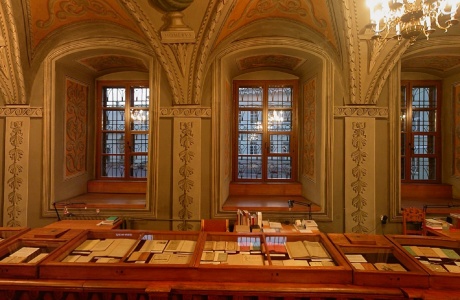

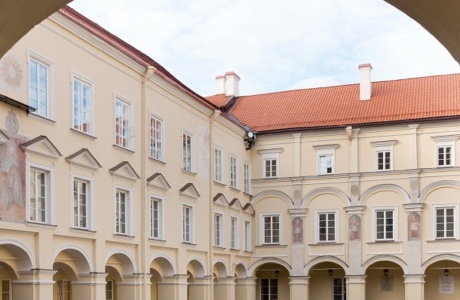
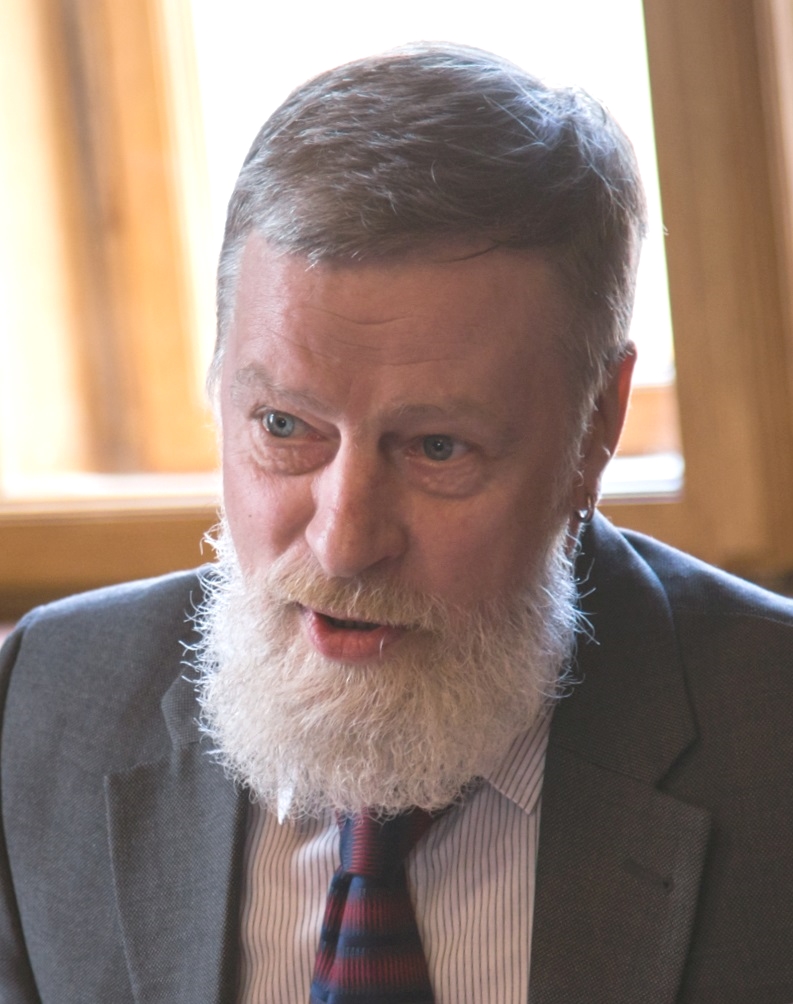 Assoc prof dr,
Assoc prof dr, 
